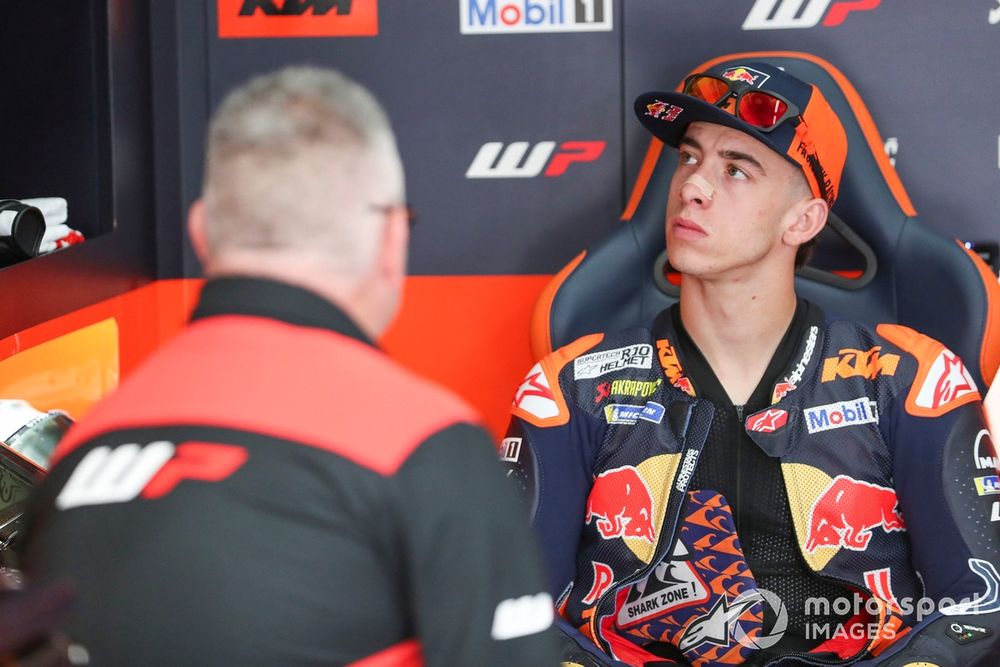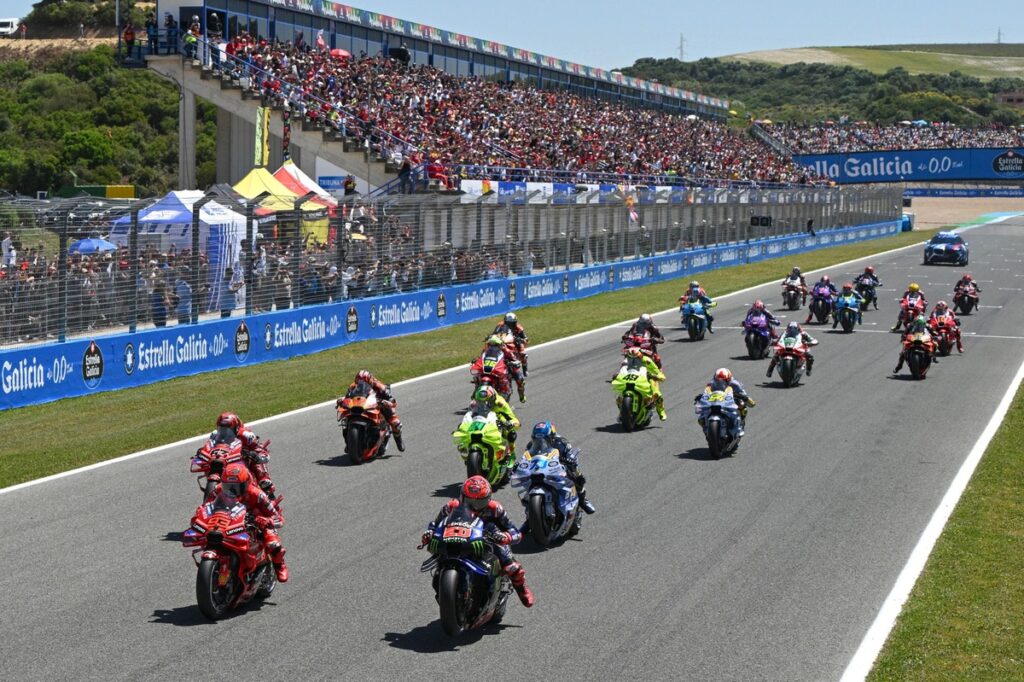“Our tyre plan was f***ed up by the crash”
So spoke Gresini Ducati team manager Michele Masini following Alex Marquez’s rollercoaster Friday at last weekend’s Spanish Grand Prix.
That’s nothing particularly unusual in motorsport, of course. But these words weren’t muttered under Masini’s breath at the back of his team’s sky blue garage. They came through loud and clear on MotoGP’s live world feed.
And then there was factory Ducati rider Francesco Bagnaia’s succinct summary of his unhappy Saturday at last month’s Qatar Grand Prix: “I f***ed up.”
This utterance didn’t go out to quite such a vast audience, but a MotoGP official press conference is still easily accessible – both live and as a replay – on the championship’s website.
Also on the MotoGP website, one can find Pedro Acosta dropping the f-word three times in the space of 10 seconds last October. So too on Spotify – or whichever platforms offers the official championship podcasts.
On none of these occasions has there been any talk of fines or punishments. See where I’m going with this?
WRC and F1 drivers have been punished in recent months for swearing in front of the media
Photo by: Romain Thuillier / Hyundai Motorsport
Let’s just say that MotoGP authorities tend to take a more relaxed stance on swearing than certain other high-profile global series.
Formula 1 and the World Rally Championship – both governed by the FIA – have tried to crack down on bad language from competitors in recent months. Thanks in no small part to F1 world champion Max Verstappen’s broad vocabulary, the issue has made its share of headlines.
There have been fines, silent protests, shows of solidarity and uneasy truces. Then, after the WRC put the issue to bed last month, FIA president Mohammed Ben Sulayem came out and admitted that maybe the organisation’s tough stance needed a rethink.
Bike racing still retains elements of its anti-establishment streak despite obvious strides in professionalism on the organisational side. Much of this is probably down to the fact that competitors face a level of danger car racers don’t
But the current state of affairs in these car championships, simply put, is that swearing in the heat of competition is allowed, but cursing in any formal media appearances is subject to sanction. In a nutshell, drivers have to watch their tongues once they leave the cockpit.
We’ve yet to hear any hint of the vocabulary police appearing in MotoGP, which is of course run by the FIM and Dorna. While comments like Masini’s will draw an apology from the commentators, that’s as far as any reaction to bad language goes.
MotoGP’s attitude aligns perfectly with the championship’s traditionally more ‘relaxed’ image. Like surfing, bike racing emerged decades ago as a pastime with counterculture tones that elite car racing has never really had in its DNA. Despite recent efforts to diversify the audience, it’s hard to argue that F1 has ever shaken off its roots as a playground for rich kids and wealthy industrialists.

MotoGP riders can be more relaxed in interviews, as the swearing clampdown doesn’t apply to the non-FIA series
Photo by: Gold and Goose / Motorsport Images
Bike racing, on the other hand, still retains elements of its anti-establishment streak despite obvious strides in professionalism on the organisational side. Much of this is probably down to the fact that competitors face a level of danger car racers don’t – at least not in the last 40 years or so.
Dicing with injury to such a visible degree makes a nonsense of anyone trying to present themselves as clean-cut and cautious. Also, to make a sweeping generalisation, bike riders up to and including MotoGP level tend to come from more humble socio-economic backgrounds than their peers on four wheels.
Barry Sheene, with that famous cigarette hole in his helmet and dashing lifestyle, epitomised all of this rather well in the 1970s. His F1 contemporary James Hunt may have been cut from the same devil-may-care cloth as Sheene, but his posh accent betrayed him. Barry, on the other hand, spoke the language of the humble Cockney. In the same way, many of today’s MotoGP riders are fellows everyday folk can identify with.
And one thing hasn’t changed since the 1970s: everyday folk tend to use four-letter words perhaps a tad more than those who consider themselves a cut above. That can even apply when they’re speaking in a second or third language. You suspect that if anybody ever did try to clamp down on the two-wheel brigade, they would get short shrift.
It’s important to underline that not all MotoGP riders and team personnel swear in front of global audiences. And that those who do indulge tend to do so at their own expense or in a humorous way. That’s related to some fundamental differences in the nature of broadcasting compared to F1 or the WRC. While MotoGP’s live pitlane reporters do catch the odd team boss in a spicy mood, the riders themselves tend to speak almost exclusively in controlled environments.
For one thing, there are no angry in-race rider radio messages to be relayed to the world. And while frontrunners in the car championships have to front up to broadcast media even in the immediate aftermath of a bad stage or incident, MotoGP has a curiously limiting custom of only chasing down the top three with its cameras and microphones.
But even if more ‘angry’ swearing did emerge due to a wider set of broadcast scenarios, that would only be another way in which the riders’ various personalities and backgrounds are revealed by the odd wicked word. It’s something MotoGP can use to differentiate itself as it markets its cast of characters. A tool the big FIA championships have taken out of their sets – for the moment at least.
MotoGP competitors should be able to remain as authentic as possible
Photo by: Gold and Goose / Motorsport Images
Whatever one may think of a 20-year-old wilfully peppering his speech with salty language, it certainly helps fans understand who Acosta is at this stage in his young life. Likewise, Jack Miller simply wouldn’t be Jack Miller if one tore pages out of his homely Queensland dictionary.
Miller is up there with Acosta when it comes to language that would make Ben Sulayem break out in a sweat. As a native English speaker, Jack can weave entire phrases of foul-mouthery. “You can only piss with the d*** you’ve got,” was his response in Jerez to media questions about his current ride.
At least that one didn’t get broadcast live to the world. But it was typical of one of Jack’s sessions with the written press. Acosta also gets more creative in his home language, particularly in these more exclusive sit-downs with the ‘print’ media.
Even MotoGP people might one day end up looking back on four-letter words with rose-tinted specs
One might think F1 drivers would at least be allowed to speak freely in that kind of briefing, but it was made clear at the Australian GP that the authorities expected even those gatherings to keep it clean. While this may not bother every F1 driver, a reportedly disillusioned Verstappen indicating a sudden wish to switch to bike racing might almost be understandable under these circumstances!
Jokes aside, MotoGP has a different approach to swearing. The freedom to speak naturally helps rider personalities stand out from each other, which is all the more important in a championship that’s relatively monotonous in terms of the nationalities involved. Native speakers of Spanish or Italian might pick up on little regional or social cues that may reveal diversity in the large cast of Spanish and Italian racers, but the rest of the world can’t. Muzzling them in English certainly wouldn’t help.
While there’s no sign that MotoGP has ever thought about doing so, it’s not hard to imagine people in high places wincing from time to time when the riders and teams open their mouths. They’ll likely be of the opinion that this is meant to be a family show, after all. But if they’re pragmatists in a world of instantly shareable content and devices in every pocket, they might have accepted that one can no longer hope to shield kids from foul language (and far more dangerous things than that).
As Liberty Media hovers on the horizon as a common (and American) link between two wheels and four, the prospect of a future push for ‘alignment’ on bad language cannot be ruled out. Hopefully that’s an unjustified fear founded on nothing more than the sensitive times we live in. Otherwise, even MotoGP people might one day end up looking back on four-letter words with rose-tinted specs.
Will a clampdown on swearing eventually make its way into MotoGP?
Photo by: Rob Gray / Polarity Photo
In this article
Be the first to know and subscribe for real-time news email updates on these topics
Subscribe to news alerts
Read the full article here

